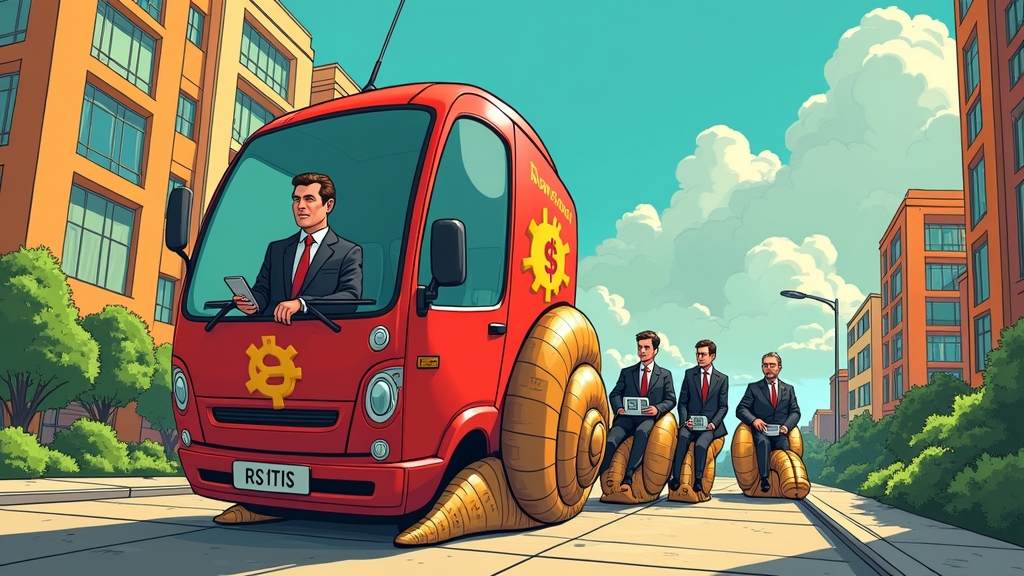EUROPE’S SOFTWARE COMPANIES LITERALLY DYING OF OLD AGE WHILE WAITING TO BECOME PROFITABLE
In a shocking revelation that has the tech world clutching their overpriced ergonomic pearls, European software companies are apparently aging like unpasteurized milk while American startups pop out billionaires faster than a Silicon Valley vending machine.
ELDERLY STARTUPS SEEN SHUFFLING AROUND WITH DIGITAL WALKERS
European “startups” – many now old enough to have midlife crises – are taking so long to become profitable that employees are reportedly receiving retirement packages before their companies do. McKinsey and Boardwave, two consulting firms that charge more per hour than your entire annual salary, have released a report titled “Europe’s Moonshot Moment,” which might as well be called “Europe’s Software Sector is F@#ked Without Immediate Intervention.”
According to the report, Europe has over 280 software companies generating more than €100 million in annual recurring revenue, which sounds impressive until you realize American companies make that before lunchtime on a Tuesday.
GROWTH SO SLOW YOU COULD LITERALLY WATCH PAINT DRY FASTER
“European software companies grow with all the speed and urgency of continental drift,” explained Dr. Kapitalism Failuré, chief economist at the Institute for Stating the Bloody Obvious. “While American companies are hosting billion-dollar IPOs, European startups are still figuring out how to get their first 15 customers without violating GDPR.”
The report found that European companies take 15 years longer than their American counterparts to become profitable, which is approximately 14 years and 364 days longer than venture capitalists are willing to wait.
EXPERTS BLAME “CULTURAL AVERSION TO SUCCESS”
Professor Monique Bureaucracy of the University of Regulatory Nightmares suggests the problem may be cultural: “Europeans have a pathological fear of excessive success. We prefer our companies like we prefer our coffee – taking an unnecessarily long time to prepare and consumed while sitting down for hours contemplating existentialism.”
The report identifies several “structural barriers” preventing European growth, including risk aversion so severe that proposing a 2% budget increase requires approval from seventeen different committees and a signed permission slip from your grandmother.
INVESTORS PRACTICING “EXTREME SOCIAL DISTANCING” FROM EUROPEAN STARTUPS
“European investors treat capital like it’s the last roll of toilet paper during a pandemic,” said venture capitalist Sir Tight Wallet. “Meanwhile, American VCs are literally throwing money at anyone who can pronounce ‘blockchain’ correctly.”
Statistics show that 97.8% of European funding meetings end with the phrase, “That’s an interesting concept, but have you considered a more conservative approach?” compared to the American equivalent: “Here’s $50 million, can you make the logo bigger?”
SOLUTION: HAVE THEY TRIED BEING AMERICAN?
McKinsey’s report suggests the radical solution of “acting more like Americans,” shocking European tech executives who had been planning to address the crisis with a 300-page white paper and a committee to study the possibility of discussing potential action items at next year’s conference.
“We’re at a critical inflection point,” warned the report, using the kind of corporate jargon that makes consultants ejaculate spreadsheets. “Europe must embrace change or risk becoming the tech world’s equivalent of a historical reenactment village.”
In response to the report, European regulators have promised swift action, with a preliminary committee scheduled to deliver initial findings by 2037, approximately when today’s European startups might finally become profitable.




